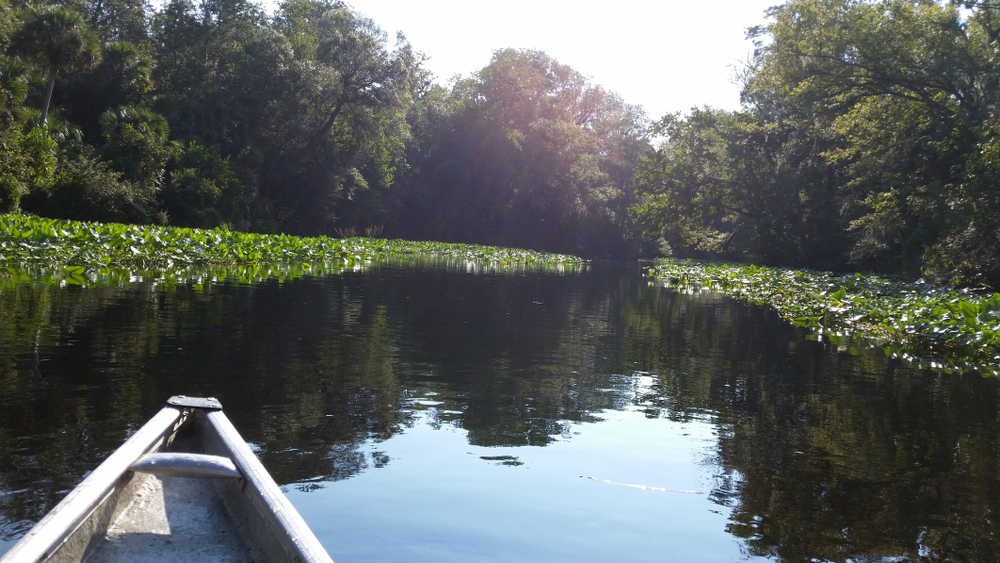After Florida’s governor preempted a pending Orange County charter amendment that would protect two rivers, a local advocacy group sued, testing a growing movement known as Rights of Nature.
Gov. Ron DeSantis recently signed the “Clean Waterways Act”, which puts more regulations on septic tanks and wastewater runoff but prevents county and city governments from writing protections for the natural environment that are stricter than those of the state.
The Orange County amendment would grant rights to the rivers and allow people to sue over development projects that threaten to pollute or degrade them.
Despite the name of the legislation, environmental groups across Florida agree the new state law will do little to stop the water pollution crisis in the state. More than a dozen counties have been working on steps to improve water quality standards.
Speak Up Wekiva sued DeSantis in federal court July 1 to declare the preemption of local self-government as unconstitutional. The complaint claims the Clean Waterways Act precludes all Florida local governments from recognizing or granting “any specified legal rights to any person, non-natural person, or political subdivision ‘relating to the natural environment.’”
RELATED: Bayer agrees to $10B to settle cancer claim, but Roundup stays on shelves
RELATED: Vape companies targeting children, claims Florida Attorney General
The suit seeks to declare the legislation as unconstitutional and seeks an injunction compelling DeSantis to “refrain from enforcing this unconstitutional preemptive statute,’’ including blocking the vote on the Orange County amendment. The amendment is scheduled to appear on the Nov. 3 ballot.
The governor’s office did not respond to requests for comment, but in a news release on passage of the Clean Waterways Act, DeSantis never referred to the portion of the bill that blocks local governments from establishing their own environmental regulations.
Instead, DeSantis referred to provisions in the bill that strengthen regulations on the state level.
“Our children and future generations serve as a stark reminder of what’s at stake when discussing the importance of creating a clean, healthy, and stable environmental foundation for their future,” he said. “We have seen overwhelming support in our efforts to protect and conserve our waterways and natural resources, and while there is still plenty of work to be done, I look forward to building upon our recent successes.”
Rights of Nature a growing movement
The first Rights of Nature laws were formulated in Pittsburgh in 2006 to keep hydraulic fracturing, commonly known as fracking, out of the city. The new movement for nature’s rights flowed into about three dozen other communities, mostly as a result of specific projects, like fracking, toxic dumping or aerial pesticide spraying, said Thomas Linzey, senior legal counsel for the Center for Democratic and Environmental Rights.
“Right now, the big one is Orange County,” he said, noting that some Rights of Nature regulations in other states have also been preempted by state government. One such instance occurred in Ohio after the city of Toledo created the Lake Erie Bill of Rights.
“Preemptions allow legislatures to be privatized for certain large businesses to clear the decks of laws that interfere with their business interests,” Linzey said. “We’ve pioneered a legal theory that when a state attempts to use preemption in that fashion, it is unconstitutional to home rule and people at the local level who make decisions about what the future of their community is going to look like.”
The situation in Florida today is much like it was when some local governments approved gun-control legislation and the state preempted, Linzey said.
“A judge stripped out part of the gun control preemptive law.”
RELATED: Notable efforts to better protect the environment
Preemption was also used in a case where Key West banned certain sunscreens that contained ingredients harmful to the coral reefs and when some cities banned the use of plastic straws to protect marine life.
“I think there is a growing belief that preemption is being overused and in an undemocratic fashion,” Linzey said, adding that he expects the courts will throw out or limit more preemptions as time goes on.
Integrity Florida, a group promoting accountability in government, issued a report in January citing 120 preemptions by state government in the past three years.
Still, the Rights of Nature movement is growing. Linzey’s group helped the National Constitutional Assembly in Ecuador amend its constitution to protect rivers there. And according to RightsofNature.org, Bolivia is in the process of implementing laws recognizing certain rights of nature. Five other countries have also adopted similar amendments, which ensure ecosystems and rivers and other waterways have the right to exist, flourish and naturally evolve.
What prompted the lawsuit in Florida?
The Wekiva and Econlockhatchee rivers both suffer from three to four times the nitrate concentration coming out of the springs than is natural, said Chuck O’Neal, Speak Up Wekiva founder. “They are both over the total daily maximum loads set for them. It is causing excessive algae growth, the die-off of eel grass and unhealthy fish to the point you can only eat so many of them” before risking illness.
Fertilizers from agricultural and residential property, septic tanks and treated wastewater account for 90% of the nitrates, O’Neal said.
His group went to the Orange County Charter Review Commission in 2019 asking it to create Right of Nature provisions that could stop the pollution. After many meetings, it was approved and set to go on the ballot. Whether or not voters approve it, the governor’s preemption would override it unless the courts intervene on behalf of the rivers.
“They couldn’t just stop with the rights of nature,” O’Neal said of the preemption. “There is another line in the law that preempts local government from doing anything having to do with the natural environment. The anti-mask people could grasp onto this bill and say the legislature has not authorized local governments to regulate air quality.” O’Neal was referring to local edicts requiring people to wear masks during the COVID-19 pandemic.
Charter governments in Florida have the right to pass ordinances that are not consistent with state law. This bill, O’Neal contends, overrides that charter right.














